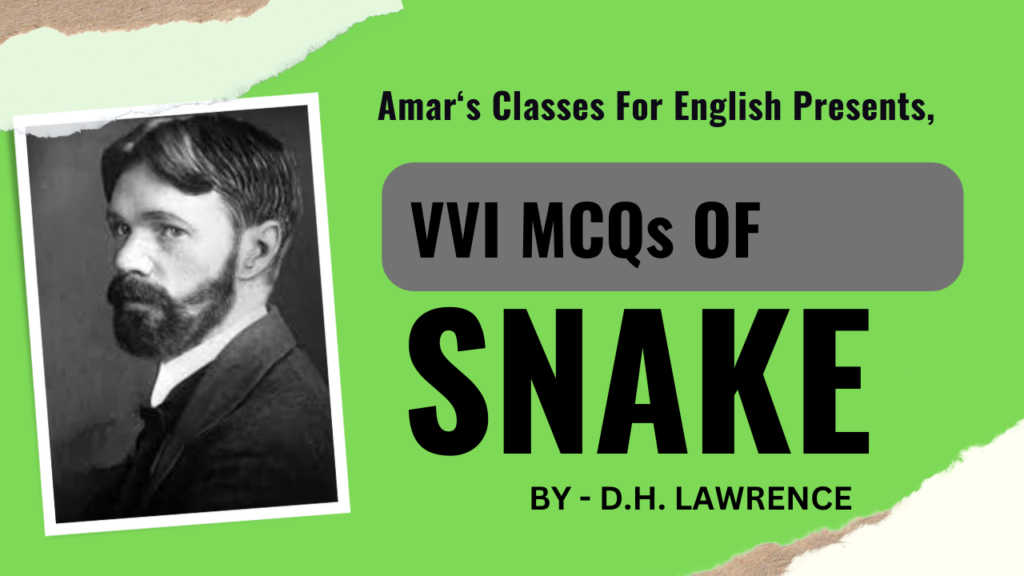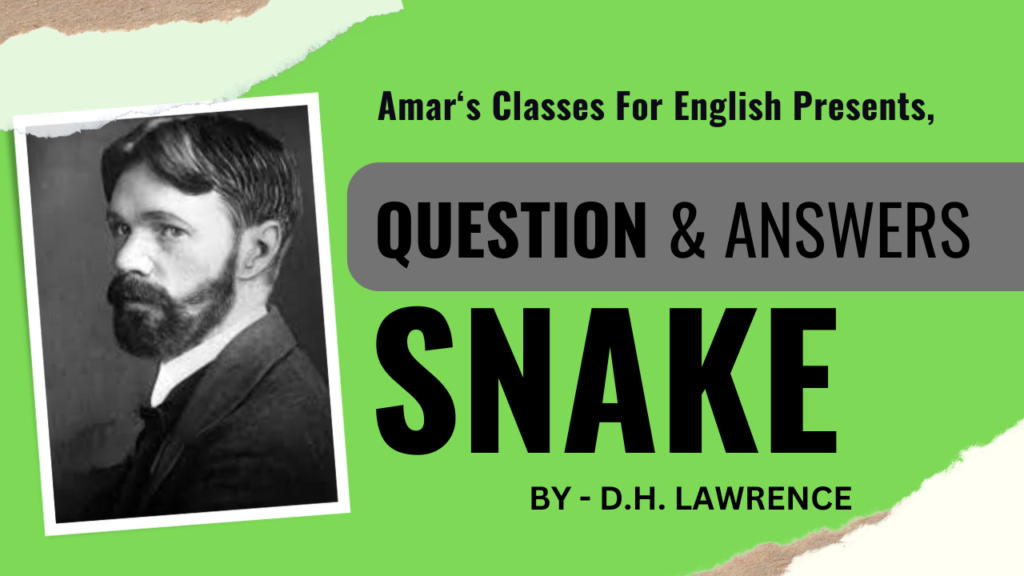
ABOUT POET
Snake is written/ composed by D. H. Lawrence. His full name is David herbert Lawrence. He was born in 11 September, 1885 in Eastwood, United Kingdom and died in 2 March 1930 in Vence, France. He was an English writer and poet. His important works are, Sons and Lovers, The white peocock, The Rainbow, etc.

WORD POWER
- water-trough : नादी
- carob tree : कैरोब ट्री
- fissure : दरार
- gloom : निराश
- trailed : पीछे खींचना
- vaguely : अस्पष्ट
- flickered : लपलपाना
- mused : सोच
- Sicilian july… Etna smoking : अधिक गर्मी
- venomous : जहरीला
- bowels : पेट की नली
- cowardice : कायर
- perversity : गलत अनैतिक सोच
- longed : चाहत
- humility : विनम्र
- hospitality :मेहमाननवाज़ी
- horrid : भयंकर
- clumsy : भददा
- clumsy log : बेढंगा लकड़ी
- clatter : दाँत कटकटाना
- convulsed : हिलना
- writhed : ऐंठना
- fascination : आकर्षण
- paltry : बहुत छोटा
- vulgar : भददा
- despised : घृणा
- accursed : श्राप
- albatross : समुद्री पक्षी
- expiate : पछताना
- pettiness: छोटा, महत्वहीन

SUMMARY
Snake is written by D.H. Lawrence. The incident on which the poem is composed is quite and simple and natural. One hot afternoon, in Sicily, the poet got up to collect the water from the trough which lay in the open ground. When he reached the spot he noticed a large brown snake resting its throat on the trough’s edge. Fascinated over this sight of the snake, the poet stood watching it for a long time. He rather realized that he was second to be there and he had to wait till the snake had quenched its thirst. The poet had learnt that the golden snakes in Sicily were poisonous and so they should be killed. Brushing aside those doubts and personal concerns the poet continued to watch the snake in its natural act quenching its thirst. And finally the snake withdrew itself and proceeded to move back into the dark hole, its dwelling place. Suddenly under a cowardly impulse the poet hurled a log at it. It missed the snake but it produced a feeling of terror in it, reflected in its haste. Afterwards the poet deeply regretted his mindless act of aggression.

VVI MCQs
1) ‚Snake‛ has been written by____
- D.H. Lawrence
- T.S. Eliot
- K.N. Daruwala
- Rupert Brooke
2) D.H. Lawrence was born in_______
- A. 1885
- B. 1855
- C. 1966
- D. 1920
3) D.H. Lawrence died in__________
- A. 1932
- B. 1931
- C. 1930
- D. 1935
4) In his writing he emerged as the champion of___
- A. Love
- B. Instinct
- C. Mankind
- D. Kindness
5) The poet saw a snake near his_________
- A. Washroom
- B. Bath-tub
- C. Water trough
- D. Kitchen
6) The snake came from a ____________tree.
- A. Banyan tree
- B. Mango tree
- C. Peepal tree
- D. Carob tree
7) The snake sipped water with his__________mouth.
- A. Straight
- B. Curved
- C. Long
- D. Short
8) It was a __day when snake came to drink water.
- A. Hot
- B. Cold
- C. Winter
- D. Rainy
9) The colour of snake was__________
- A. Black-yellow
- B. Golden-brown
- C. Black-brown
- D. Yellow-Brown
10) The speaker considered himself a __________comer to the trough
- A. First
- B. Second
- C. Third
- D. Fourth
11) The snake looked the poet__________
- A. Lovingly
- B. Vaguely
- C. Hate
- D. Amar Sir
12) He__________his tongue while drinking.
- A. Take out
- B. Flickered
- C. Curved
- D. Straightned
13) The poet picked up a________log.
- A. Heavy
- B. Thick
- C. Light
- D. Clumsy
14) The snake looked like a _______in exile.
- A. King
- B. Emperor
- C. Queen
- D. Saint
15) In Sicily ________snakes are poisionous and___are innocent
- A. Black-Blue
- B. Gold-Yellow
- C. Gold – Black
- D. Gold -Blue
15) The snake flickered his______tongue from his lips.
- A. Two-forked
- B. Three-forked
- C. One-forked
- D. Four-forked
16) The poet threw a clumsy log at water trough with______
- A. Clatter
- B. Power
- C. Lightly
- D. Tightly
17) The poet missed his chance to meet with one of the___________
- A. Lord’s of life
- B. Devil’s of life
- C. Queen’s life
- D. King’s life
18) The poet was in_________when he came to drink water to his water trough.
- A. Pyjama
- B. Jeans
- C. Night dress
- D. Coat
19) The poet came down the steps with his__________
- A. Pitcher
- B. Bowl
- C. Can
- D. Drum
20) ‚Sicily island‛ is in _______country
- A. America
- B. India
- C. Italy
- D. England
21) Water trough is kept under a __________tree.
- A. Carob
- B. Mango
- C. Neem
- D. Banana
22) The snake came from the ________of the poet’s house
- A. Fissure
- B. Hole
- C. Bottom
- D. Top
23) The speaker confess that he______
- A. Hated the snake
- B. Liked the snake
- C. Killed the snake
- D. Feared the snake
24) In Sicily, black snakes are considered-
- A. Innocent
- B. Venomous
- C. Playful
- D. Gloomy
25) The phrase ‘a king of exile’ in the poem stand for
- A. The lion
- B. The Elephant
- C. The snake
- D. The Tiger
26) After hitting the snake with a log the speaker of the poem ‘snake’ wants to
- A. Enjoy
- B. Celebrate
- C. Expiate
- D. None of these
27) The speaker in the poem ‘snake’ hits the snake with –
- A. Gun
- B. Bat
- C. Log
- D. Rod
28) The speaker of the poem compares the snake with the sea- albatross of
- A. The Scholar Gipsy
- B. The Ancient Mariner
- C. Eve of St. Agnes
- D. Lycidas
29) ‘The voice of my education said to me He must be killed; these line are taken from
- A. The soldier
- B. Fire- Hymn
- C. Snake
- D. Song of Myself
30) He lifted his head from his drinking, as cattle do’ is written by-
- A. T. S. Eliot
- B. D. H. Lawrence
- C. Rupert Brooke
- D. John Keats

VVI QUESTION & ANSWERS
1) Where did the speaker meet the snake?
The speaker met the snake near water trough of his house. It had come there to drink water. The speaker had also went there for the same purpose.
2) Why had it come out of its hole near the trough?
It had come out of its hole near the trough to drink water because it was too hot and the snake was thirsty.
3) Why did the speaker decided to wait?
The Speaker decided to wait because the snake had come first near the water trough and he was a second- comer.
4) How did the snake drink water?
The snake went to the water-trough and put his mouth upon the depth of that trough. He sipped the water with its straight mouth.
5) What is the meaning of ‘Sicilian July’ with Etna smoking?
‘Sicilian July’ with Etna smoking mean extreme heat like the one caused when Etna erupted i.e. it was so hot as the volcano Etna in Sicily.
6) What is the belief prevailing in Sicily about a snake?
The belief prevailing in Sicily about a snake was the black snakes are innocent, the gold are venomous. So yellow-brown snake would be killed.
7) Do you think he had a conflict in mind?
Yes, I think that he had a conflict in mind. He was afraid of it and also though that it was afraid of it and also thought that it was a guest which came to drink water at his house.
8) What thing about the snake did appeal him most?
It came to the poet’s house to drink water as a guest. it came calmly for the purpose and departed peacefully being satisfied, had appealed him most.
9) Why did he not like it going back to the dark hole?
The poet did not like it going back to the dark hole because he was just thinking about the snake that it was just like a guest and as such like a god.
10) What was his reaction after hitting the snake?
The speaker regretted after hitting snake. He felt that he had done wrong. How mean, how much uncivilized was his act. By doing so he had committed a sin, was his reaction.
11) Why did the speaker consider it ‘a king in exile’?
The Speaker considered it ‘a king in exile’ because it was peaceful and had done nothing wrong with him. He was his guest as well. It look was like a king in exite. It did not misuse its power.
12) What does poet mean by the ‘The Voice of education’?
His voice of education ordered him to kill the snakes . As per his education , Golden snakes are venomous and black snakes are innocent . The snake that poet saw was golden and thus harmful for him. So his inner voice asked him to kill the snake.
